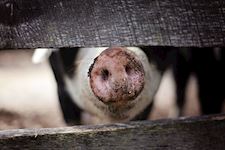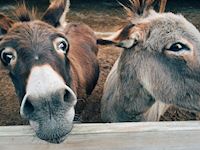Animal Diseases - Endorsed Certificate Course (TQUK - Training Qualifications UK)
Distance learning course with study materials, tutor support and final exam included
Academy For Distance Learning
Summary
- Exam(s) / assessment(s) is included in price
- Tutor is available to students
Add to basket or enquire
Overview
Diagnosing Animal Diseases Online Course. 100 Hours Endorsed Certificate Course (TQUK - Training Qualifications UK).
Animal Diseases course online. This course is developed to assist animal owners to decide when symptoms could indicate a serious condition, and therefore warrant calling a vet. The course will help you to recognise a disease and determine an appropriate course of action to initiate in order to obtain a diagnosis.
Routine disease investigations are based on clinical, pathological and epidemiological evidence. If there is a need for conclusive identification of a disease or condition, an accurate laboratory diagnosis should be obtained. It is particularly important, especially in the case of infectious diseases that the final diagnosis rests on adequate aetiological evidence. In most cases disease investigations are carried out by qualified government stock inspectors and/or veterinarians. It helps for animal owners to understand and be able to recognise diseases conditions that may affect their animals, so that timely intervention can occur.
Benefits of an ADL Endorsed Course?
Endorsed courses are skills based. They have been evaluated and approved by an independent awarding body such as Training Qualifications UK (TQUK).
What makes ADL’s Endorsed courses different?
- Flexible Self-Paced Learning– adjust your learning around your home and work commitments
- Start and Finish at any time
- Courses globally and industry relevant
- Practical Component at the end of most lessons.
Allocated your own tutor relevant to your subject. You can have as little or as much contact as you like with your tutor. They are there to support you all the way through.
This course is endorsed by TQUK -Training Qualifications UK, an OFQUAL awarding body.
Achievement
Course media
Description
Lesson Structure:
- How Animal Diseases are Diagnosed:
- Conducting clinical examinations, gross and clinical pathology, information to collect and how to collect it (live animal and necropsy samples), specialist support services to assist in diagnosis (i.e. types of laboratories, specialist vets etc)
- Diagnostic Testing:
- Pathways followed to detect and diagnose different types of diseases information to be supplied with samples for diagnostic testing diagnostic techniques
- Viral Diseases:
- Characteristics of viruses and the significance of a range of viral diseases that affect animals. viral taxonomy, types and structure of viruses, virus replication cycle, transmission some common viral conditions.
- Bacteria and Fungal Diseases:
- Characteristics of bacterial and fungal organisms laboratory identification controlling infections, specimen collection, an important disease conditions.
- Parasitological Conditions:
- Discuss and differentiate a range of conditions that are caused by parasites. Terminology and classification, life cycles, protozoa, helminths, and arthropods.
- Metabolic and Nutritional Conditions:
- Lesson covers a range of common metabolic conditions affecting cattle, horses, pigs, sheep/goats, cats and dogs.
- Poisoning: Discuss and differentiate some common disorders that result from poisoning or toxins.
- Cardio-respiratory, Central Nervous System (CNS), dermatological, gastrointestinal, hepatological, and haematological disorders.
- Inherited Conditions (Genetic Disorders):
- Discuss types of genetic inheritance, and give examples of genetic diseases affecting horses, dogs, and cats.
- Other Conditions and Disorders:
- Identify and discuss miscellaneous conditions such as allergies, dehydration, and age related conditions.
- Research Project:
- In this project you will evaluate symptoms of ill-health or disease displayed by a set of animals, and go through the process of identifying the problem and deciding on a course of treatment.
Each lesson culminates in an assignment which is submitted to the academy, marked by the academy's tutors and returned to you with feedback, any relevant suggestions, comments, and if necessary, extra reading.
Who is this course for?
Veterinary students, Agriculturalists, Farmers, Animal Breeders
Requirements
A pc or laptop with internet connection.
Career path
ADL has helped thousands of people develop their farming and agricultural knowledge and skills. The course will help you to recognise a disease and determine an appropriate course of action to initiate in order to obtain a diagnosis.
Questions and answers
Currently there are no Q&As for this course. Be the first to ask a question.
Reviews
Currently there are no reviews for this course. Be the first to leave a review.
Legal information
This course is advertised on reed.co.uk by the Course Provider, whose terms and conditions apply. Purchases are made directly from the Course Provider, and as such, content and materials are supplied by the Course Provider directly. Reed is acting as agent and not reseller in relation to this course. Reed's only responsibility is to facilitate your payment for the course. It is your responsibility to review and agree to the Course Provider's terms and conditions and satisfy yourself as to the suitability of the course you intend to purchase. Reed will not have any responsibility for the content of the course and/or associated materials.





